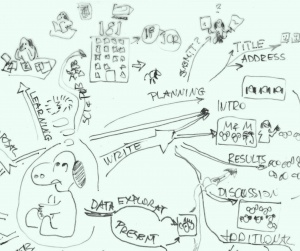Objectives
Objectives of the course:
The objective of this course is to introduce participants to the details of communication and writing scientific publications. The main emphasis is on the most common form, the “primary scientific paper”, but other forms will be covered. Matters related to oral presentations, poster preparation and proposal writing will also be discussed. Thus participants will become familiar with the forms of presenting new findings to various scientific forums.
Please note that the main focus of this course is on how to structure a scientific text, i.e. the rules and requirements, building up the actual text, presenting findings, etc., and not very much on the actual language, i.e. grammar, vocabulary, language structure, etc. The latter will only be touched briefly upon.
Learning outcomes and competences:
At the end of the course the student should be able to:
- Judge and decide about the appropriate form and forum for their work
- Evaluate potential publication forums
- Write a scientific manuscript that conforms to the rules and requirements
- Analyse their presentation efficiency and improve it in their written work
- Deal with scientific editors, and others involved in the scientific publishing process
- Prepare and present effective oral presentations and posters
Minimum formation of students: This course does not require previous publishing experience or material waiting to be published, but aspiring authors, PhD and MSc students will benefit most from it.
Directed to: Master or PhD students; PhD students in the phase of writing or preparing to write would benefit most from this course. MSc students can sign up if places remain available.
General Plan
Note: This course will only occur in presential format
- The current structure of scientific literature, the basics of scientometrics, the main features of the scientific information ‘industry’, how to decide where to publish
- The different parts of a primary scientific paper and how to write them
- The publication process (manuscript preparation, submission, dealing with editors, technical editing and printing)
- Requirements of grammar and style
- Principles of preparing figures and tables
- Oral presentations: preparation and delivery, poster preparation, conference participation
Type of course/teaching methods:
Lectures, exercises, group discussions
Literature:
Gastel B, Day RA 2016. How to write and publish a scientific paper. 8th ed. Cambridge Univ. Press
Cargill M, O’Connor P 2009. Writing scientific research articles. Wiley-Blackwell
Compulsory programme:
Participants have to be present at 80% of the lectures (this means that they can miss two half-days), and actively participate in the group discussions and exercises.
For FCUL PhD students requiring credits additionally to the exercises done during the week the delivery of a written report (three assignments, see below) done after the course is mandatory, to deliver during the weeks after the course. Such report is also advised for other students requesting creditation of the course in their institutions.
Course assessment:
Pass/fail on the basis of attendance, activity, and appropriately prepared assignments (for PhD students with credits obtained from the course), such as (exact exercises to define during the course):
- On the basis of an abstract of a published paper, analyse and if necessary, modify the title.
- Write a max. 2 page evaluation of a summary of a published paper or conference abstract.
- Write an analysis of a published figure.
This course can give credits to PhD programmes at FCUL or of programmes with partnership from FCUL and other institutions with 6h-7h of contact hours per ECT, as a function of specific requirements. For these students additionally to the exercises done during the week the delivery of a written report done after the course is mandatory. For programmes with less hours of contact per ECT (6h/ECT, getting 6 ECTs from the course) students need to do an additional assignment (summary report). If needed 1 or 2 additional hours of contact may be added. Such report(s) are also advised for other students requesting accreditation of the course in their institutions.
Funding
Students fees
Partners
n.a.
Fee
Free for 1st year PhD students of FCUL enrolling in it as part of the curricular year; also free for 1st year PhD students in the Doctoral program Biodiversity, Genetics and Evolution (UP), Biology and Ecology of Global Changes (UA) and Sustainability Science (UL, several institutions), when the course counts credits for their formation; in all these cases the delivery of a final report done after the course is mandatory; the course is also free for more advanced PhD students of the BIODIV programme (ULisboa or UPorto); 50 € for more advanced PhD students of cE3c; 80 € for PhD students of the PEERS network (CFE); 125 € for FCUL Master students, more advanced PhD FCUL students and unemployed (not from cE3c); 180 € for BTI, BI and other PhD students; 250 € for Professional and postdocs.
When the maximum number of students is reached, 10 vacancies will be available for non-paying 1st year PhD students mentioned above, being, by order of preference students from: 1) cE3c; 2) BIODIV (not from cE3c); 3) FCUL (not from cE3c); 4) Sustainability Science (not from cE3c or FCUL); 5) BEAG (not from cE3c or FCUL).
Candidates should fill in the following FORMULARY:
CLOSED
This formulary is strictly confidential, as explained in the introduction, and the data are required because the cE3c Advanced Courses are also offered as part of the PRR programme of FCUL.
When filling the formulary mind to:
- FILL ALL THE MANDATORY FIELDS
- UPLOAD CV AND MOTIVATION LETTER, both mandatory; use the names as instructed there
- If you want to resume later SAVE the formulary, otherwise you will need to fill everything again
- At the end SUBMIT the formulary before exiting
For any doubts please contact the cE3c coordinator of the cE3c courses Margarida Matos, email mmmatos@fc.ul.pt
mmmatos@fc.ul.pt

